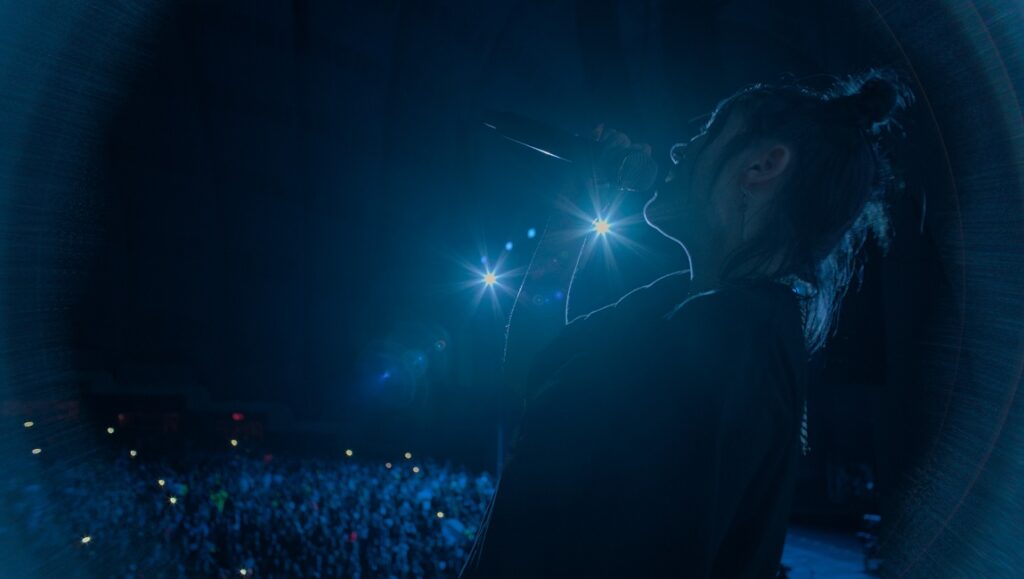The World’s a Little Blurry has plenty for die-hards to like and is welcomingly relaxed, but ultimately remains a pro forma exercise with little to recommend it to the uninitiated.
During the past couple years, the popstar portrait-documentary has seemed to establish itself as a part of a trendy new sub-genre. More than anything, this development looks like an elaborate marketing strategy, particularly during the music industry’s 2020 where world tours fell victim to COVID-era safety measures. It’s also worth noting that a majority of these docs highlight female superstars, a tendency that reflects a movement of empowerment to reaffirm autonomy in the face of label and public pressures. Thus, Billie Eilish: The World’s a Little Blurry — as its title may also suggest — is another project born of the present’s uncertainty, and a new way for the Californian teen music icon to remain engaged with her global fanbase. For his part, director R.J. Cutler tries to keep his film in complete fidelity to Billie Eilish’s character and her music: to remain, aesthetically, casual, hunkered in a very subdued mood and a down-to-earth demeanor. Eilish even states to her fans at a concert, “I don’t know why you love me, I’m nobody.” Indeed, it’s a quality successfully achieved, but one which functions both for and against the film. Billie’s personality and music, as fans already know and which is here reinforced, is fragile and melancholic. It reflects a kind of delicacy that Cutler clearly intends to fully embrace, but it doesn’t necessarily give his work the power and charm to make it as exciting or soulful as it should be. Cutler isn’t inclined to focus on the typical hows and whys of Eilish’s immediate and rapid ascent to stardom, instead, tending more toward a cinéma verité style as a means to bringing the artist’s fans and admirers into her daily life, across a one-year journey from being an ordinary girl-next-door to a multi-award-winning cultural phenomenon. The problem, then, is that this is all handled in an entirely unchallenging and straightforward fashion.
There are some flourishes, particularly as the film captures Billie with and around her family; during her famous bedroom-songwriting sessions with her older brother Finneas, Cutler chooses a home movie-style visual aesthetic. Largely, though, the film is content to observe. It follows the artist’s mundane life on and off the stage, at home and on the road, behind the scenes of music videos and album photoshoots, and giving international interviews, all while struggling with various psychical and emotional ailments and afflictions: detailed are the shin splints she suffers, her thrown-out neck, and myriad nervous tics, as well as the heartbreak, insecurities, and general gloominess that will be familiar to so many of her young fans. As Eilish seems to be a distinctly transparent spirit, the film leaves everything in plain sight, because if there’s anything that can best explain Billie’s talent and appeal, it’s found in her truthful and nonchalant presence and charisma — it’s no wonder that the most effective moments here come when the 19-year-old megastar takes the stage and bears all of this while performing her honest and raw material.
And yet, none of this proves either immediately satisfying or cinematically impressive enough to justify the film’s extended 140-minute runtime — which, oddly, even has a brief intermission — especially given that it’s all about an artist whose life and career is still in bloom and hasn’t had the time to become prolific enough to justify this padding. It’s clear that the target audience for The World’s Little Blurry is Billie’s die-hard Gen Z fanbase or those who — in the spirit of any true fanatic — are excited and willing to consume the same stories and facts they’ve endlessly heard. The flip side of that relaxed approach, though, and the best of this Cutler and Eilish collaboration, is that Billie is not made into a calculated heroine of her story or any kind of national icon, and the pair are content to keep this as a simple coming-of-age narrative. Obviously, The World’s a Little Blurry still occasionally seeks to engage the viewers’ sentimentality, but if there’s an essential message to be found here, it can be understood through the story of Eilish’s childhood crush for Justin Bieber: how she succeeded in getting his attention, ultimately meeting and befriending him personally — in other words, it’s something of a soft “the world as will and representation” lesson for today’s teenagers. In an earlier scene, we see Billie and her family discussing the idea of “conventionality” in music, and the siblings argue with their parents that a song doesn’t need to be made for everyone. A fair point, but if this biopic-doc proves anything, it’s that film can resist being made for “everyone” and still remain a little too conventional. Or, to phrase it according to Billie’s own lyrical style: it’s a bland doc, duh!
You can currently stream R.J. Cutler’s Billie Eilish: The World’s a Little Blurry on Apple TV+.


Comments are closed.